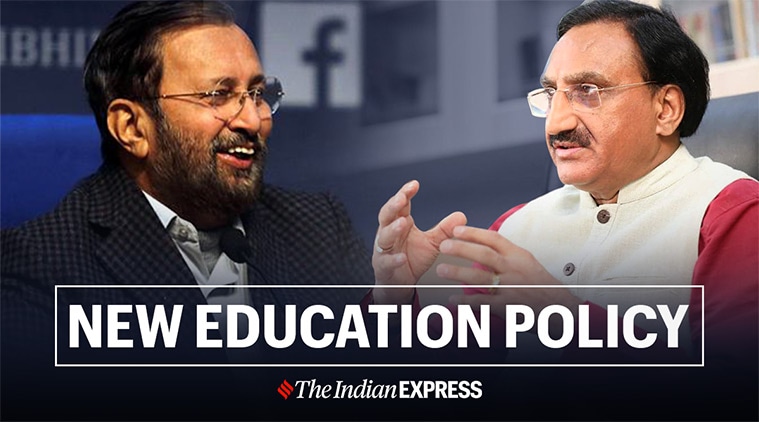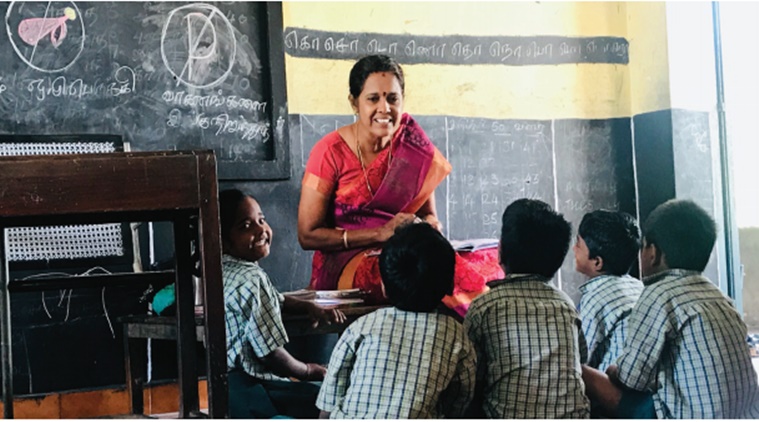 Education Policy gets a nod from Cabinet
Education Policy gets a nod from Cabinet
New Education Policy 2020 HIGHLIGHTS: The Union Cabinet on Wednesday approved the new National Education Policy (NEP) and renamed the HRD Ministry as Education Ministry. Making the announcement, Union Ministers Prakash Javadekar and Ramesh Pokhriyal Nishank said there would be a single regulator for all higher education institutions and MPhil would be discontinued.
In a bid to ramp up digital learning, a National Educational Technology Forum (NETF) would be created. “E-courses will be developed in eight regional languages initially and virtual labs will be developed,” Amit Khare, Higher Education Secretary, said.
Top 100 foreign colleges will be allowed to set-up campuses in India. According to the HRD Ministry document, listing salient features of policy, “such (foreign) universities will be given special dispensation regarding regulatory, governance, and content norms on par with other autonomous institutions of India.”
Standalone Higher Education Institutes and professional education institutes will be evolved into multi-disciplinary education. “There are over 45,000 affiliated colleges in our country. Under Graded Autonomy, Academic, Administrative and Financial Autonomy will be given to colleges, on the basis of the status of their accreditation,” he further said.
Read | Key takeaways for NEP 2020
The committee — which suggested changes in the education system under the NEP — was headed by former ISRO chief K Kasturirangan. The NEP was drafted in 1986 and updated in 1992. The NEP was part of the election manifesto of the ruling Bhartiya Janta Party (BJP) ahead of the 2014 elections.
 New Education Policy to have rules on education, recruitment of teachers among other issues (Representational image)
New Education Policy to have rules on education, recruitment of teachers among other issues (Representational image)
“If there are going to be common entrance exams in universities, why do we need board exams? What is the need for duplication? A policy, which is now going to be in place for the next few decades, is completely silent on sports,” Delhi CM Manish Sisodia said on NEP
One of the permanent tasks of the NETF will be to categorise emergent technologies based on their potential and estimated timeframe for disruption, and to periodically present this analysis to MHRD. Based on these inputs, MHRD will formally identify those technologies whose emergence demands responses from the education system. Content will be available in regional languages also.
An autonomous body, the National Educational Technology Forum (NETF), will be created to provide a platform for the free exchange of ideas on the use of technology to enhance learning, assessment, planning, administration and so on, both for school and higher education.
The report cards of students will be reviewed by peers and teachers. Artificial Intelligence-based software could be developed and used by students to help track their growth through their school years based on learning data and interactive questionnaires for parents, students, and teachers.
The approval of the NEP by the government is a positive step forward. NEP is the outcome of an extensive, highly participatory and inclusive consultation process. NEP aims at meeting existing challenges in education and building the foundation of India’s promising future. We look forward to its implementation, said JNU V-C M Jagadesh Kumar.
The National Testing Agency (NTA) will now be provided additional charge to conduct entrance examinations for admissions to universities across the country, according to the New Education Policy (NEP) released on Wednesday.
As per the new policy, the entrance exam to be conducted by the NTA for admission to universities and colleges will be optional. The new system has some similarities to standardised aptitude test, SAT conducted for admissions in the United States of America.
Following a protest by political parties, the reference to Hindi and English in the draft NEP regarding the three-language formula has been dropped from the final policy document. “The three languages learned by children will be the choices of States, regions, and of the students, so long as at least two of the three languages are native to India,” the policy states.
On the medium of instruction in schools, the education policy states, “Wherever possible, the medium of instruction until at least Grade 5, but preferably till Grade 8 and beyond, will be the homelanguage/ mothertongue/ local language/ regional language. Thereafter, the home/local language shall continue to be taught as a language wherever possible. This will be followed by both public and private schools.”
Gujarat Pradesh Congress Committee spokesperson Manish Doshi in a statement said that the new policy will promote commercialisation of education and a reduction in expenditure on education coupled with a reduction in scholarships, especially for Scheduled Caste (SC) and Scheduled Tribe (ST) students.
Board exams will be low stake. The focus will be on testing concepts and knowledge application. All students will be allowed to take Board Exams on up to two occasions during any given school year, one main examination and one for improvement, if desired, as per the NEP
While the Board exams for Grades 10 and 12 will be continued, the existing system of Board and entrance examinations shall be reformed to eliminate the need for undertaking coaching classes. Board exams will be redesigned to encourage holistic development; students will be able to choose any of the subjects in which they take Board exams, depending on their individualized interests, as per the policy.
The government dropped the provision that stipulated Hindi as one of the languages that students should study in Grade 6 after protests from political parties, mainly in Tamil Nadu, who saw this as “imposition” of Hindi. Its biggest concession to the Sangh is more symbolic than substantive — renaming of the HRD Ministry to Ministry of Education.
All education institutions will be held to similar standards of audit and disclosure as a ‘not for profit’ entity. Surpluses, if any, will be reinvested in the educational sector, as per the NEP. There will be transparent public disclosure of all these financial matters with recourse to grievance-handling mechanisms to the general public. All fees and charges set by private HEIs will be transparently and fully disclosed, and there shall be no arbitrary increases in these fees/charges during the period of enrolment of any student.
BVoc degrees introduced in 2013 will continue to exist, but vocational courses will also be available to students enrolled in all other Bachelor’s degree programmes, including the four-year multidisciplinary Bachelor’s programmes. ‘Lok Vidya’, that is, important vocational knowledge developed in India, will be made accessible to students through integration into vocational education courses.
Vocational education will be integrated into all schools and higher education institutions in a phased manner over the next decade. By 2025, at least 50% of learners through the school and higher education system shall have exposure to vocational education, for which a clear action plan with targets and timelines will be developed.
An Academic Bank of Credit (ABC) shall be established which would digitally store the academic credits earned from various recognized HEIs so that the degrees from an HEI can be awarded taking into account credits earned. For instance, now if a student covers a topic related to his or her degree